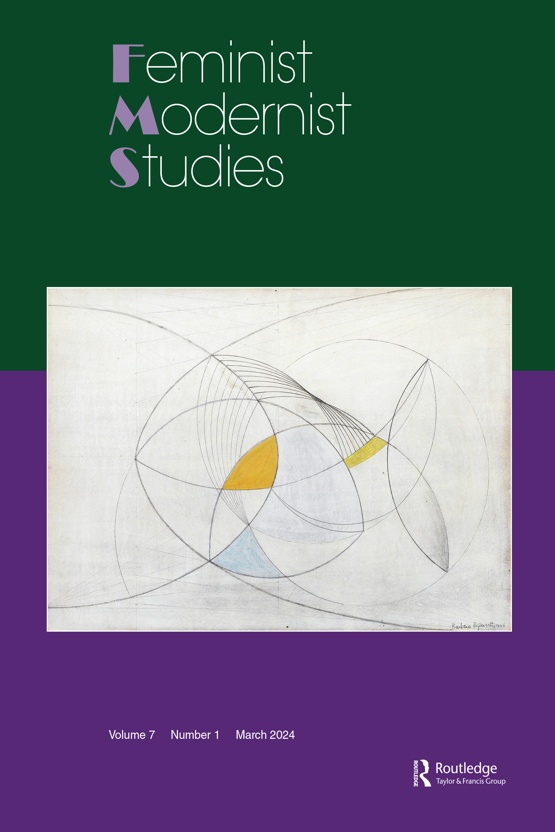Submit a Manuscript to the Journal
Feminist Modernist Studies
For a Special Issue on
James Joyce in relation: Gender, Labour, Legacy
Abstract deadline
Manuscript deadline

Special Issue Editor(s)
Ronan Crowley,
Goethe University Frankfurt
this.ronan@gmail.com
Georgina Nugent,
University College Cork
georginanugent@ucc.ie
James Joyce in relation: Gender, Labour, Legacy
The mythology that surrounds James Joyce’s modernism has often relegated women to the margins: as patrons, publishers, typists, lovers, translators, or simply as foils to his creative genius. From Sylvia Beach, Harriet Shaw Weaver, Margaret Anderson, and Jane Heap to Nora Barnacle, Mary Colum, Maria Jolas, and Amalia Popper, the women around Joyce have long been written into critical history as either self-sacrificing “helpmeets” or antagonists—when they appear at all. Rarely has scholarship reckoned fully with the complex dynamics of collaboration, exploitation, rivalry, and dismissal that characterize Joyce’s relationships with women. Too often, the misogynistic tone of Joyce’s remarks—and of some of his narrative postures—has been taken at face value, whether excused as artistic temperament or wielded as evidence of modernism’s masculinist ethos. Yet such characterizations often reflect the priorities of midcentury Joyce scholarship as much as Joyce himself, quietly sustaining the framing of many women writers in his orbit as derivative or minor.
This special issue of Feminist Modernist Studies invites new feminist, queer, intersectional, and transnational approaches to the question of Joyce and his women contemporaries—not to confirm familiar critiques of Joyce’s misogyny, but to reconsider how such critiques have been shaped by their own critical genealogies. What happens when we read against the grain of Joyce’s dismissals—and of the masculinist traditions that have often mediated those dismissals—to trace the reciprocal, resistant, or parallel energies of the women around him? How might we rethink the networks of modernism if we center these women not simply as facilitators of Joyce’s genius but as writers, artists, intellectuals, and interlocutors in their own right? Rather than rehearsing Joyce’s judgments, this issue seeks work that questions how those judgments have been canonized, contested, or quietly upheld within modernist scholarship itself.
We welcome essays that challenge hagiographic accounts of Joyce’s career and that examine the gendered structures of modernist production, reception, and canon formation. Contributions might address, but are not limited to:
- Reconsiderations of the women in Joyce’s publishing, editing, and patronage networks
- Joyce’s contemporaries in modernist writing, visual art, and performance, including Djuna Barnes, Mina Loy, Gertrude Stein, Stella Steyn, Virginia Woolf, and others
- The reception histories of modernist women contemporaries of Joyce and the ways their work has been framed as derivative or secondary
- Anti-feminism and misogyny in Joyce’s letters, attributed remarks, and creative works
- The reception histories of women associated with Joyce and the ways their work has been framed as supporting, enabling, or secondary rather than as creative or intellectual labor in its own right
- Networks of collaboration, competition, dismissal, or influence between Joyce and women writers or artists
- Comparative studies of style, experimentation, and aesthetic politics across Joyce and his women contemporaries
- Queer and intersectional readings of Joyce’s engagements (or failures to engage) with women’s modernisms
- Methodological reflections on feminist historiography, canon critique, and the ethics of archival work in Joyce studies
We are especially interested in work that engages feminist and queer scholarship, challenges nationalist or Eurocentric framings of Joyce’s networks, and explores how structures of power and privilege have shaped both modernist production and its critical afterlives.
Submission Instructions
Advance inquiries are welcome. Proposals of 350–500 words and a short bio (maximum 100 words) should be sent to both editors by January 1, 2026: Ronan Crowley (this.ronan@gmail.com) and Georgina Nugent (georginanugent@ucc.ie). Selected submissions will be notified by February 2, 2026. Final edited manuscripts of 7,500–8,500 words (including references and works cited) will be due for production by May, 2027.

